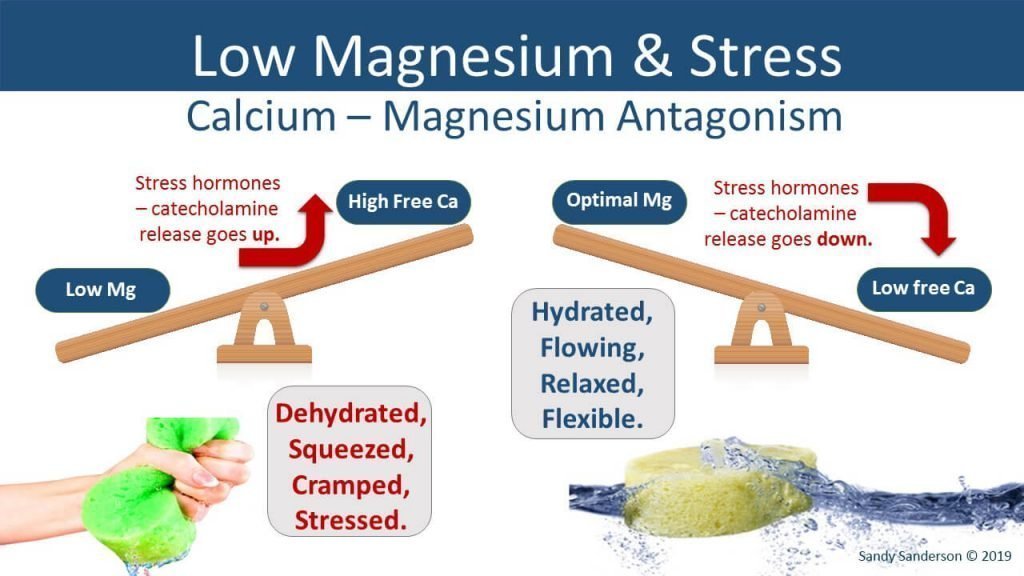Magnesium is used to make hormones, as magnesium is essential for protein synthesis, and hormones and neurotransmitters are proteins.
Hormones greatly influence our growth and development, health, behaviours, metabolism, sex life and fertility. Pretty well everything we do and experience in life is governed by the chemical messages of hormones.
As we get into our more mature and senior years, or are young but chronically stressed, our energy and hormone production can become out of balance, acidic, oxygen-deprived and dehydrated. If you would like to know how to prevent this type of premature ageing and keep your heart performing like it should, then read on.
In this article I will focus on catecholamines (stress hormones) including cortisol, adrenaline and aldosterone, which are produced by the adrenal glands and directly affect the cardiovascular system.
Heart health, stress and ‘Renin-Angiotensin-Aldosterone-System’ (RAAS) activation

The Renin-Angiotensin-Aldosterone-System (RAAS) is triggered by activation of the sympathetic nervous system (stress response) in the HPA (hypothalamic-pituitary-adrenal) axis. The cascade of stress hormones affects metabolism and cell water balance, which can have even more deleterious effects by increasing the stress cascade. If not controlled, this can lead to a negative feedback loop – a downward spiral.
“The increase in sympathetic activation during stress leads to an increase in renin production. The increase in renin production results in a higher level of blood AngII… [which] contributes to the formation and release of adrenocorticotropic hormone (ACTH), adrenal glucocorticoid, aldosterone and catecholamines.” 1
The adrenal glands are two small triangular glands that sit on top of each of the kidneys. They directly produce three essential hormones: cortisol, adrenaline and aldosterone.
Cortisol (hydrocortisone) is a glucocorticoid (catecholamine/stress hormone) that gets us ready for action and exercise. It binds to receptors mainly on the fat cells, liver and pancreas, which increases insulin and glucose levels available for muscles. At the same time it has anti-inflammatory, immunosuppressive, anti-proliferative, and vasoconstrictive effects.
Interestingly, cortisol can inhibit other systems during a ‘fight or flight’ sympathetic nervous system response. Cortisol has a prioritising role when it comes to high level exercise, pretty well shutting everything else out so it doesn’t interfere with the emergency action required in the moment.
Cortisol can inhibit digestion, growth, reproduction and the immune system. It can counteract an allergic reaction too, but if you are pushing out too much cortisol you may not be digesting your food properly, and your fertility may also be affected. So, balance is crucial.
The normal cortisol cycle increases in the morning as the sun comes up, and declines in the evening after sun down. If your cortisol cycle increases in the evening when you should be sleeping, too much blood sugar will end up in your blood and have to get stored by the liver as fat.
You put weight on because you have too much fuel circulating, but not enough to do with it as you don’t need the energy during sleep. It can be associated with metabolic syndrome, gut disorders, diabetes and sleep problems. These cycles can be retrained and changed, so see your health care professional if you are concerned about it.
Adrenaline (epinephrine) is another catecholamine stress hormone that stimulates the heart muscle to pump blood. When we are in danger, have fear or need to do urgent hard exercise, we must have a big adrenaline surge to release the energy for quick action, and the cortisol combined with insulin makes the glucose available for mitochondria in cells to make the energy we need. It can also suppress the inflammatory response and allergic reactions.
Cortisol and adrenaline help you to run away from the tigers and climb that tree so you don’t get eaten, that is, during the sympathetic mode (fight or flight). These hormones tend to suppress inflammation and allergic responses because the need to escape danger overrides the need for the immune system to engage, or for digestion to be completed. The body waits until it’s safe again before switching from sympathetic to parasympathetic mode, which is the recovery phase (rest and digest phase) where digestion, detox and healing take place.
When the body’s arteries and heart muscle squeeze to push blood around the circulation they do it via engagement of renin and angiotensin, which can in turn use other vasoconstrictors like vasopressin or endothelin to help push the calcium into smooth muscle cell membrane channels to create the squeeze. The vasoconstrictors also help to push blood against gravity into the brain if there is not enough blood volume due to dehydration. This can cause headaches and migraines.
The squeeze is then released and relaxed by magnesium for the return vessel expansion and blood flow. Magnesium (with water) controls the calcium efflux and re-stabilisation of the cell membrane of the smooth muscles of the endothelial lining of blood vessels.

During high-level exercise or quick action, more adrenaline is released to stimulate extra blood flow and pumping. The adrenaline pushes the RAAS. When the calcium is engaged in the push cycle, it also temporarily dehydrates the part being squeezed, and that’s why aldosterone comes in to increase sodium, which moves the water away to the interstitial areas. In this case, more magnesium is released from cell stores and used to re-balance and re-hydrate.
This fast-switching cycle of ebb and flow, contraction and expansion, work quickly to re-balance in a healthy body. However, when the electrolyte and water balance is upset, and stress takes its toll without abatement, the cardiovascular system can suffer sustained drops in pH with consequential hypercalcemia, which are damaging and can lead to cardiovascular disease (CVD), including hypertension.

Aldosterone is a mineralocorticoid hormone, which is primarily involved in the regulation of electrolyte and water balance in the blood vessels via the epithelial cells of the renal tubules of the kidney. It helps the kidneys to release sodium if the body needs to release water, or to retain sodium if the body needs to hold water back in order to dilute waste concentration. Sodium and water can help to buffer the acids formed by metabolic wastes, if those wastes are not adequately detoxed and excreted.
If the fluids of the vascular system get dehydrated or low in electrolytes, they can get too thick or too thin, which affects blood pressure up or down respectively.

Aldosterone is a key marker in the development of cardiovascular diseases. “The level of aldosterone was found to be 20 times higher in patients with heart failure than in normal individuals. It is thought that this increase is due to the increased production of aldosterone in the adrenal glands and subsequently high AngII concentration. Aldosterone has electrolytic and metabolic effects, stimulating the development of myocardial fibrosis and facilitating cardiovascular remodelling and development of disease processes.” 1
The increase of aldosterone levels over time is associated with hypertension and a dehydration effect because more sodium is retained by the kidneys (and remember that sodium holds back water in the interstitial spaces between cells). This occurs when the body doesn’t have enough electrolyte, water and acid-buffering resources to re-stabilise the cardiovascular system’s pH requirements.
If higher aldosterone leads to hypertension, and its release is triggered by increasing stress levels, then decreasing stress and recovering from stress symptoms will strongly support the maintenance of a healthy cardiovascular system.
Salt is our friend
In the past it was thought that the culprit causing cardiovascular disease (CVD) was sodium salt, and so began the demonisation of sodium in order to protect the heart and vascular system.
However, in recent reviews it was found that the reduction of sodium made no difference to the progression of CVD, and that the more significant contributors are deficiencies in potassium and magnesium. “Higher intakes of potassium and magnesium were both associated with reduced risks of CVD regardless of sodium intake, while lower intakes of sodium had no independent beneficial effects on CVD risk.” 2

Magnesium salt is the actual cell gate-keeper holding the potassium salt inside the cell and also guarding mitochondrial metabolism.3 4 A drop in magnesium, and consequently potassium, causes a depolarisation of the membrane charge and acidification of the plasma.
When magnesium and potassium move from inside the cell to outside the cell, sodium and calcium move from outside the cell to inside the cell. This causes dehydration, with the pH change making blood thicker, denser and more viscose, and thereby increasing blood pressure. Toxins can’t be as readily removed, so the risks of inflammation and degeneration also go up.
Stress hormones themselves tend to have an acidifying effect, but as cell pH drops and is not buffered and neutralised, more stress hormones are released to deal with the acidosis stress in the system. It’s like a revolving door.
The stress hormones make your muscles shake or spasm. The brain feels anxious because it is desperately in need of electrolytes and water. An electrolyte imbalance can also feel like a blood sugar crisis (hypoglycemia) with headaches, weakness or dizziness. We can feel a sense of panic or anxiety that something isn’t right and we need to take some kind of action to fix the problem.
Interestingly, when adrenal cells are deprived of sodium salt, they also release stress hormones in response. But magnesium can have a dampening effect on the stress hormones, and scientists have shown how magnesium can block them. 5

The important thing to remember is that the body needs a certain amount of sodium salt to function properly before it triggers excessive stress hormones. The mean intake in this study was 3 grams per day, but some people ate up to 5 grams per day. One T-shirt doesn’t fit all and everyone needs to work out what their ideal amount is for normal functioning. If you are an athlete and perspire a lot you could need a lot more sodium than most people.
Nevertheless, it’s helpful to know that extra magnesium can be brought in to save the day by suppressing the stress hormones, stabilising the cardiovascular system and calming heart rhythm.

Usually drinking enough mineral charged water with magnesium, potassium, sodium and chloride will replenish the water and electrolyte balance, restoring pH levels and returning the aldosterone and catecholamine (stress hormone) levels back to normal. If it’s not quite enough, then use extra transdermal magnesium (magnesium cream, oil or lotion) via massage or have a magnesium bath soak.
If you have long suffered hardening of the arteries from calcium deposition (resulting from chronic magnesium deficiency), then it’s a tougher problem to solve. It’s also advisable to seek the help of your doctor with an holistic approach to adjust diet and lifestyle. You will still need a lot more water and magnesium to dissolve away the hardened calcium structures and restore flexibility in blood vessels. Getting your water and electrolyte balance right is crucial.
Magnesium deficiency and degeneration
The stress hormones have a dehydrating and acidifying effect. Magnesium however has a direct stress hormone dampening effect. When more magnesium is present the vasoconstrictors and stress hormones retreat, and hydration and pH balance can return (assuming you also have enough of the other electrolytes).
If there is not enough available magnesium, the calcium may continue to stimulate the smooth muscle and cause arrhythmias, electrical disturbances and cramping. 6 7
The body can also use nitric oxide (NO) to expand the smooth muscle vessel wall. If you have an angina attack the paramedic or doctor usually gives you some nitroglycerin so that the NO can quickly relax the vessels and heart muscle. An intravenous injection of magnesium chloride can also relax the system quickly. The relaxation effect of NO is independent of magnesium, however the body does need magnesium to make the NO in the first place.
Magnesium also acts as an antioxidant to neutralise acids and counteract Reactive Oxygen Species (ROS) – a potent free radical that damages tissue cells and mitochondria. Acidification and degeneration are always associated with magnesium deficiency, and when we get enough magnesium we can turn around this destructive cycle.
The title of ‘Master Mineral’ does indeed belong to magnesium, as most other nutrients depend on it as a co-factor, including the activity of enzymes. It is the electrical connection of magnesium that plugs us into the mitochondrial powerpoint. Magnesium has a strong affinity with water and thus helps to re-hydrate cells, improving electrical conductance and metabolism.
Healthy exercise, sleep, electrolyte and water balance improves cardiovascular health
Excessive stress without enough recovery can cause us to get stuck in the autonomic state of sympathetic mode (‘fight or flight’). This state causes excessive magnesium loss via the kidneys, acidification and deprivation of oxygen. Getting stuck in this kind of overdrive really wears you out. Low magnesium is itself quite stressful, as it leads to hyper-sensitivity and less resilience to stress. So, it’s a revolving door. The less magnesium, the more sensitive to stress we get and the worse the repercussions of stress symptoms

As our mitochondria depend on magnesium to produce ATP (adenosine triphosphate), our electrical energy currency, our metabolism is affected by magnesium deficiency, causing chronic fatigue, adrenal insufficiency and depression.
The ATP energy system also supports enzyme activity and the production and balance of hormones – which is affected by low magnesium. You can get over-stressed, sleep-deprived, and feeling cranky, miserable and washed out, and may also get more pain-sensitive and achy. Watch out if anyone comes near!
You can turn all this around with a few essential strategies…

Recovery from stress with sound restorative sleep is essential, and magnesium helps you to sleep better by suppressing the stress hormones. Melatonin is a powerful antioxidant and essential hormone-neurotransmitter produced by the pineal gland during deep sleep. It detoxes our brain and central nervous system.
If you don’t get enough deep sleep you can’t make enough melatonin to clean up the neural waste products, which are oxidising and damaging to mitochondria. You also need melatonin for melanin production, which is another powerful antioxidant found in all organs of the body. Stress just cascades into more stress if you are not careful, and the stress of not sleeping well leads to cardiovascular disease and hypertension.

Exercise stress is a good kind of stress (in moderation) that increases oxygen supply and improves vascular flexibility and blood pressure, as well as hormone balance. It causes the adrenal glands to release cortisol, which harnesses blood glucose to get it to cells for metabolism.
Exercise triggers release of insulin by the pancreas, which helps glucose get access to cells for mitochondrial energy production (phosphorylation). It also removes excess glucose from the blood that is not used for metabolism, taking it to the liver for storage as glycogen.
Insulin is the pivotal hormone involved in metabolism, regulating cellular energy supply, macronutrient balance, and cardiovascular protection.
You know what they say; “The challenges make us stronger.” We need the exercise and the oxygen to blow out the cobwebs! During the recovery phase when you rest and replenish your magnesium reserves, the body rebuilds and makes you stronger and fitter for purpose.
Magnesium plugs us into the mitochondrial powerpoint of metabolism of ATP, our electrical energy supply. It drives the making of proteins, enzymes and the control of calcium in the ebb and flow of contraction and expansion of muscles and vessels in the cardiovascular system.

As magnesium has a dampening effect on the stress hormones, it relaxes muscles and calms the nerves, helping to switch the autonomic system from sympathetic mode to parasympathetic mode (rest and digest mode). Therefore, it is both the power behind electrical energy bursts, as well as the power of rest, digest, detox and rebuilding. Exercise performance, balance and recovery is totally dependent on the availability of magnesium.
To maintain a healthy cell pH for electrical conductivity and blood fluidity, make sure to eat a healthy fresh food organic (paleo, keto, low carb) diet because excessive sugars in the blood cause acidic by-products, which lower pH and oxygen availability, causing insulin resistance and inhibition of nitric oxide production.
Magnesium is the single most important mineral that helps electrolyte and water balance, and thereby protects us from damage to the endothelial lining of arteries, heart disease and hypertension caused by stress hormones.
Balance is the key to best health!
By Sandy Sanderson © 2022
References:
(1) Ayada, C.; Toru, Ü.; Korkut, Y. The Relationship of Stress and Blood Pressure Effectors. Hippokratia 2015, 19 (2), 99–108.
(2) Pickering, R. T.; Bradlee, M. L.; Singer, M. R.; Moore, L. L. Higher Intakes of Potassium and Magnesium, but Not Lower Sodium, Reduce Cardiovascular Risk in the Framingham Offspring Study. Nutrients 2021, 13 (1), 269. https://doi.org/10.3390/nu13010269.
(3) Seelig, M. S. Consequences of Magnesium Deficiency on the Enhancement of Stress Reactions; Preventive and Therapeutic Implications (a Review). J Am Coll Nutr 1994, 13 (5), 429–446.
(4) Seelig, M. S.; Rosanoff, A. The Magnesium Factor; Avery: New York, 2003.
(5) Pinto, J. E. The Blocking Effect of Magnesium on the Secretion of Adrenal Catecholamines Induced by the Omission of Sodium from the Extracellular Medium. Hormone and metabolic research = Hormon- und Stoffwechselforschung = Hormones et metabolisme 1979, 11 (6), 404–407. https://doi.org/10.1055/s-0028-1092749.
(6) Dibaba, D. T.; Xun, P.; Song, Y.; Rosanoff, A.; Shechter, M.; He, K. The Effect of Magnesium Supplementation on Blood Pressure in Individuals with Insulin Resistance, Prediabetes, or Noncommunicable Chronic Diseases: A Meta-Analysis of Randomized Controlled Trials. The American journal of clinical nutrition 2017, 106 (3), 921–929. https://doi.org/10.3945/ajcn.117.155291.
(7) Kolte, D.; Vijayaraghavan, K.; Khera, S.; Sica, D.; H. Frishman, W. Role of Magnesium in Cardiovascular Diseases; 2014; Vol. 22.

